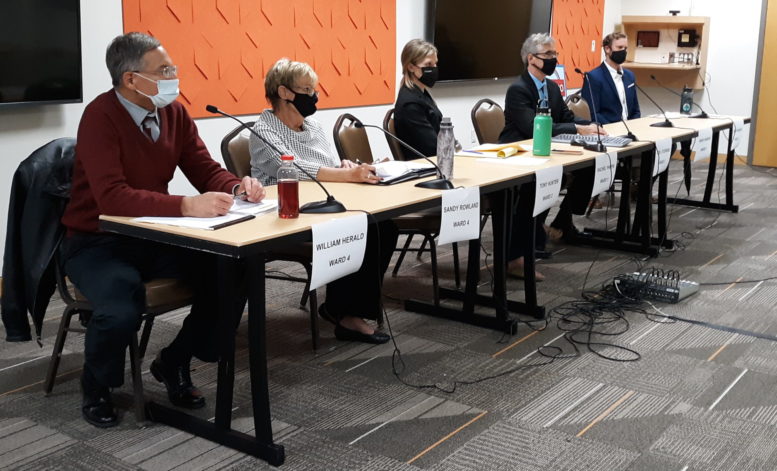By JAN LARSON McLAUGHLIN
BG Independent News
The quality of rental housing and the quantity of housing options in Bowling Green were discussed Sunday evening during a candidates forum hosted by the East Side Residential Neighborhood Group and several BGSU organizations.
Five of the nine candidates for Bowling Green City Council answered questions posed by BG Falcon Media’s Andrew Bailey and BG Independent News’ David Dupont.
The forum came less than a week after City Council passed an ordinance on rental housing registration and inspection requirements. So the candidates were asked how satisfied they are with the ordinance.
Bill Herald, Fourth Ward candidate, said the ordinance is a great start – with adjustments likely over time.
“This is a major first step,” he said. “Everybody understands it’s multi-phased,” with modifications to be made as needed.
Sandy Rowland, Fourth Ward candidate, agreed. “I do think this will change as it grows.” But the ordinance is a start – finally.
“After 40 years, something has happened,” she said. “Putting together something was not easy. Two landlords have openly threatened they would sue over this.”
Rachel Phipps, Third Ward candidate, said she is satisfied that the ordinance will help protect tenants, identify problem rentals, and help preserve neighborhoods.
The inspection portion of the ordinance is heavy on tenant education and city verification if problems are reported.
“This is a lighter touch than other cities have employed,” Phipps said.
Joel O’Dorisio, Second Ward candidate, said he is proud of the work done on the ordinance.
“I think it’s going to allow us to identify problem units,” and get a better picture of rental housing issues in the community, he said.
Nick Rubando, First Ward candidate, agreed the ordinance is landmark legislation for the city, but he would have preferred more responsibility placed on landlords.
“I would have liked to have seen us not put so much burden on tenants” to identify and report problems, he said.
But he said the ordinance will be a pathway for the city and tenants to go after bad actors.
The next question asked the candidates how the city can improve tenant understanding of their rights.
Rubando held up a letter that was handed to him before the forum began.
“I think this is a great first step,” he said.
Prior to the forum starting, Mark Remeis, of AA Green, handed out newly-written letters that Mecca Management plans to give their tenants. Remeis said Mecca wants to work with the city to ensure safe rental housing.
“We want to work together,” he said. The letter reads:
If you experience any maintenance or safety concerns with your residence, help exists.
- Contact your landlord. Most landlords want to provide quality, safe housing. It is in everyone’s best interest. Landlords want to keep their properties in good condition and make their tenants happy.
- If you don’t receive results from your landlord in a timely manner, contact:
- The City of Bowling Green Zoning Department at 419-354-6218.
- The Wood County Health Department at 419-352-8402.
- BGSU Student Legal Services at 419-372-2951.
- Bowling Green Fire Department at 419-352-3106.
- If you don’t receive the desired outcome, contact the Bowling Green Municipal Court at 419-352-5263.
Rubando said tenants need to be aware of the landlord checklists. “I encourage all tenants to be intelligent about these forms,” he said.
O’Dorisio agreed that the ordinance leans heavily on tenants.
“It’s important to make sure the information is not just readily available, but that it’s given to every tenant when they move in,” he said.
Phipps said tenants must be given copies of the self-inspection checklists, which also must be posted in the rental units.
Rowland said parents of renters can also report problems. She advised that problems first be reported to landlords, then to the city if the problems aren’t resolved.
Herald emphasized the education component of the ordinance, with the 51-point self-inspection form being given to tenants.
The candidates were asked if they had concerns about the regulations stifling economic development. None shared that concern.
Rowland, who is a Realtor, said Bowling Green’s economic development currently suffers from the lack of quality housing stock in the city.
“We need improvements in our housing stock. We need new housing stock drastically,” she said, noting the number of BGSU’s administration employees who live in Perrysburg because they can’t find suitable housing here. “That is choking our economy.”
Rowland also said she would like to see some of the historic houses revitalized rather than be turned into rentals, “to make sure they shine.”
Phipps said the city’s new regulations encourage preventative maintenance and help preserve neighborhoods. She also noted that the city’s land use plan adopted in 2014 calls for more housing – but the current zoning code includes 66 barriers to that, she said.
The zoning code update should help remedy this, she said.
O’Dorisio said the city lacks starter houses and reasonably priced homes.
“This is a critical economic issue for us,” he said. “We are heavily dependent on rental housing in this community.”
The updated zoning code could help by allowing for higher density housing in some areas, he added.
Rubando agreed and said, “revitalizing our neighborhoods is essential to our economic development.”
Herald noted that neighborhood revitalization is a current council goal – and the pieces are in place now to help it happen.
The candidates were then asked about the spread of student rental housing from the east to the west side of the city.
O’Dorisio said the housing inspections will help prevent issues in all parts of the city. There is a perception of rental homes bringing devaluation to a neighborhood, but the city’s ordinance can help maintain higher quality in homes.
It was agreed that the east side of the city has borne the brunt of issues from rental housing, which makes up at least 60% of the housing in the community.
“The health and safety of our rental units doesn’t matter if they are on the east or west side,” Phipps said.
“Rental legislation is going to address both sides of Main Street,” and be enforced the same regardless of location, Rowland said.
“I’ve really never viewed it as an East Side only issue,” Herald said. “Main Street is not a barrier.”
“This affects the entire city,” Rubando said. “I’m excited to see how this can improve the First Ward and all of Bowling Green.”
The candidates were asked about the possible role Bowling Green State University should play in housing concerns.
Phipps suggested that the city and university work together on the issue, possibly with BGSU offering a “carrot” by providing a list of preferred rental properties and owners.
“I think we always work better when we work as a team,” she said.
Rowland noted the university already provides legal services for students who encounter housing issues. Well over 50% of the complaints heard by Student Legal Services involve housing.
Many students leave Bowling Green with negative feelings about the rental housing quality and bad experiences of deposits being unfairly kept by landlords, she said.
“If we improve our housing, we’re going to improve the number of students living in Bowling Green,” Rowland said.
Herald described the city’s relationship with BGSU on the rental housing issue as “dynamic and unfolding.” He suggested that a rental registration website could be produced by students.
BGSU has the opportunity to make sure students are aware of the new ordinance, Rubando said.
O’Dorisio mentioned the concerted effort by BGSU to get rid of the “party houses” on East Wooster Street.
“The university has certainly been aggressive working with housing along the border,” he said. O’Dorisio also noted that Ohio State University certifies rentals in the area of its campus.
The candidates were asked if potential legal threats should be a deterrent to housing legislation – even if many of the Ohio communities that require rental inspections have successfully defended their ordinances in court.
Herald said the city has to balance the risk of litigation against the benefits. Some cities have incurred court fines over their ordinances, he said.
“Of course we don’t want to be wasting city money,” he said. “It’s one of the factors we take into account.”
Rowland said City Council listened carefully to legal counsel on the issue. “If we go to court and lose, it’s the taxpayers who lose.”
Rowland said a landlord reported her to the Realtors Association because she supported the rental registration legislation.
“That’s the kind of pressure they are putting on,” she said.
Phipps said the city is appropriately cautious about such matters. “I think the ordinance we just passed is on solid legal footing,” she said.
O’Dorisio said that laws are subject to interpretation. “I think we should not be afraid of making changes,” he said.
Rubando said it is “extremely unfortunate” that landlords have threatened to sue rather than work with the city. “I find that disheartening,” he said. “They want to take it to the courts rather than doing the right thing.”
Herald cautioned that all landlords should not be painted with the same broad brush.
“You can’t paint all landlords as evil,” he said. “Many of them are pillars of the community.”
Rubando agreed, and said the new ordinance will “root out the bad.”
The candidates were asked if there is any way to keep landlords from passing along the new rental registration fees to tenants.
Rubando said he would prefer that the cost not be pushed onto tenants, but added that the $3 per month charge for the program is worth the expense.
O’Dorisio agreed, saying that $3 a month should not be an issue.
“The need in the community is to have safe, clean housing, and make sure rentals are good neighbors,” he said.
Phipps said the actual cost of the program is still unknown, but the city administration can come to city council for approval of funding.
“I think it would be naive to think it won’t be passed on to tenants,” she said.
Rowland agreed that she would rather not see the fees tacked on to rental costs.
Herald explained that the council committee working on the ordinance was advised to not add costs – though that may need to be reassessed. However, he added that the city can’t stop landlords from charging tenants to recoup their expenses.
The candidates were then asked about the city’s former “Yoder” rule limiting rental units to three or fewer unrelated tenants – that was found by a court to be unconstitutional and arbitrary.
Rowland said the city now follows the rule recommended by the judge of one person per bedroom in a rental. The police division continues to enforce nuisance party and noise rules.
Phipps said the zoning code update will address some of the residency rules. And tenant education information sheets are handed out annually to explain city regulations on such issues as parties and noise.
O’Dorisio agreed that the new zoning regulations can replace the three-person limit. He also said the culture at BGSU is different than it was a decade or so ago. It used to be a common sight to see people sitting out in lawns, drinking alcohol. But thanks to BGSU and the police division, a “swift cultural change” has occurred, he said.
Rubando said the “Yoder” rule was clearly unconstitutional, so the city has “no reason to rehash that.” Zoning changes could cut down on parking and noise issues, he added.
Herald said when the three-person rule was thrown out, the city pivoted to the rule of one unrelated person per bedroom. Now the issue is defining what constitutes a bedroom.
And Rowland said there are also issues about defining “family” members.
The candidates were asked if they are concerned about the mayor’s directive that the rental housing ordinance not create additional bureaucracy or jobs. That leaves the city’s small planning department to handle the city’s zoning update, the historical preservation effort, and the rental housing program.
O’Dorisio said the city administration is undergoing structural changes that may help.
Phipps is confident that the city administration will study if an inspector should be added to the planning department staff. “I would certainly support that.”
Rowland agreed the city has shifted some assignments and is studying the issue. “I do have faith in the administration.”
Herald said the administration is considering its role in inspections. “We will reassess as time goes on.”
Rubando said he supports hiring additional staff to handle inspections. “I just want to make sure it’s done correctly.”
The candidates then introduced other housing issues affecting the community.
Phipps said the city may want to consider exterior code enforcement. “It’s an opportunity to dig in and find what other communities are doing. To find out what’s working and what’s not.”
O’Dorisio said the city must address the dearth of affordable housing. Currently two-thirds of the housing units in the city are rentals. “There’s not many communities that have that high of a percentage.”
For Rubando, “revitalizing our neighborhoods is essential.” The city needs more starter homes to attract and maintain residents. “Fair, affordable and equitable housing,” he said.
Herald said the city may want to re-address exterior housing inspections – balancing homeowner rights with what’s good for the community. While door-to-door campaigning, he has noticed several neighborhoods with homes that are problems.
Rowland said the mayor has talked about exterior inspections to get rid of eyesores. Currently, the city has little power over eyesores.
City Council has set priorities for 2022 that can help with housing issues, she said, such as neighborhood revitalization, zoning updates, Gateway District development, street repairs and sustainability efforts.
Phipps also mentioned the COVID relief funds that can be used for neighborhoods.
“We all want neighborhoods that we can be proud of,” she said. “We need leaders who can find common ground and creative solutions.”
O’Dorisio said the mention of exterior home standards brought out his “Libertarian streak.” While the city has a role in maintaining safe and clean housing, it has no business mandating aesthetic standards. If residents want that, they should live in an area managed by a homeowners association, he said.
Rubando suggested that neighborhoods would benefit from better sidewalks. While going door-to-door, he has noticed many in ill repair.
“There’s definitely some room for sidewalk improvements,” he said.
Herald mentioned that his suggested priorities for 2022 of streets, sidewalks and drainage were adopted by City Council.
Rowland talked about the 30 miles of street repaving, plus curbs, sidewalks and ADA ramps that are being planned with some of the COVID rescue funds.
Phipps said the candidate forum showed a lot of common ground on issues, and a commitment to make improvements to the city. She said it was unfortunate that some other candidates did not respond to the forum invitation.
At-large candidates Mark Hollenbaugh and Greg Robinette were out of town and unable to attend. First Ward candidate Mark Hanson and Third Ward candidate Tony Hunter reportedly did not respond to multiple emails to participate in the forum.





